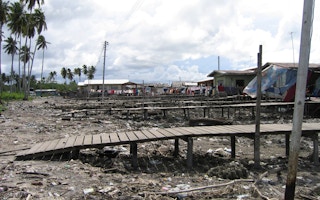In an unprecedented move against plastic pollution in Southeast Asia, Malaysia has announced that it will eliminate single-use plastic by 2030.
To continue reading, subscribe to Eco‑Business.
There's something for everyone. We offer a range of subscription plans.
- Access our stories and receive our Insights Weekly newsletter with the free EB Member plan.
- Unlock unlimited access to our content and archive with EB Circle.
- Publish your content with EB Premium.
At a recent town hall meeting, newly appointed minister in charge of environment matters Yeo Been Yin revealed that the country will launch a road map towards zero-use plastics by 2030 at the International Greentech and Ecoproducts Exhibition Malaysia next month.
The road map includes a nationwide charge on plastic bags and to only serve plastic straws upon customer request.
According to Yeo Been Yin, the road map will also offer suggestions for plastic manufacturers on how they can transition to alternatives such as reusable straws. She said: “The ministry doesn’t want to kill the plastic manufacturers but prepare them to produce more eco-friendly products.”
The latest announcement follows one made a few days earlier by Malaysia’s Federal Territories Ministry on the implementation of a plastic straw ban in Kuala Lumpur, Putrajaya and Labuan. Beginning January 1, an awareness campaign on the negative impact of single-use straws will be conducted throughout the year, before the ban is fully enforced on licensed traders and food operators in 2020.
Licenses issued from 2019 onwards will also state the requirements of the ban, which leaves “no excuse for business owners to claim ignorance,” according to ministry secretary-general Datuk Seri Adnan bin Haji Md Ikshan. Once the ban is in full force, businesses found to be using plastic straws run the risk of having their licenses revoked. Exemptions will also be made for the handicapped and others who need to use straws and plastic items in their daily activities.
Malaysia is the world’s eighth biggest plastic polluter, according to a global 2015 study in Science Magazine. It estimated that in 2010, the country produced almost one million tonnes of plastic waste that was not recycled or properly disposed of. Malaysia is also one of the top exporters of plastic in Southeast Asia.
Beating plastic pollution in Southeast Asia
With Malaysia now cracking down on single-use plastic, will its neighbours follow in toughening their policies against plastic pollution?
This year, governments in the region were said to have “launched a war on plastic waste,” even though strategies to manage waste remain in their early stages and policies such as nationwide bans and taxes have failed to take root. Many have imposed partial bans on plastic, even though the Association of Southeast Asian Nations (Asean) has no regional mechanism to tackle the waste clogging its shared oceans and rivers.
The Mekong region, which is shared by half of the countries in the region, is the largest global contributor to plastic waste in the marine environment. According to research by Ocean Conservancy, a non-profit environmental advocacy group, China, Indonesia, Thailand, Vietnam and the Philippines hold more than half of the world’s plastic waste.
So far, legislation against plastic waste in the region has differed from country to country, with a handful of nations imposing limited bans on certain single-use plastic products and others issuing a levy on plastic bags.
In 2016, Indonesia conducted a three-month trial that placed a fee for plastic bags in mega cities such as Jakarta. However, despite plastic bag usage falling by more than 50 per cent as a result of the initiative, retailers refused to sustain the tax, arguing that there was no “sound legal basis” for the “controversial policy.”
Earlier this year, the government attempted once again to impose a tax on plastic bags but it failed to get off the ground due to protest from plastic manufacturers and the industry ministry.
Cambodia introduced a levy on plastic bags earlier in April, but it is limited to shopping centres and supermarkets. The government aims to expand the initiative to wet markets and other retail stores.
A ban on single-use plastic also came into effect in the Philippines’ city hall in August, with plastic utensils, bags and straws banned from all government offices and programmes. Local governments have also enforced zero-plastic policies in their cities, such as in Dumaguete City, where plastic bags have been completely banned in its public market.
Across the border from Malaysia, Singapore has held off on introducing policies that either ban or tax single-use plastic, instead favouring alternative approaches to reduce plastic use. The government has instead urged long-term solutions to tackling the issue such as awareness campaigns targeted at the public’s plastic consumption habits.










